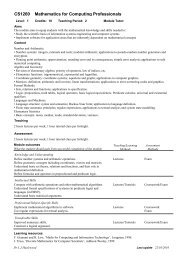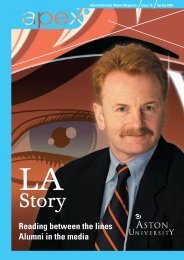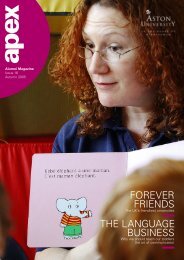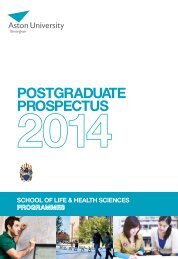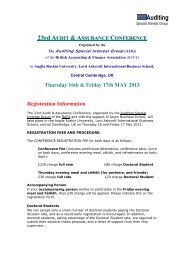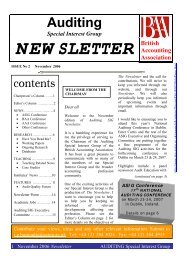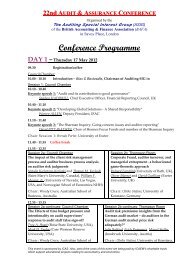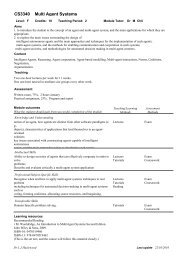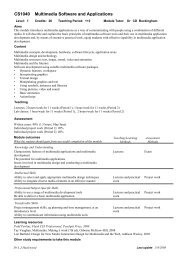Postgraduate ProsPectus - Aston University
Postgraduate ProsPectus - Aston University
Postgraduate ProsPectus - Aston University
Create successful ePaper yourself
Turn your PDF publications into a flip-book with our unique Google optimized e-Paper software.
School of Engineering & Applied Science<br />
Nanoscience Research Group<br />
School of Engineering & Applied Science<br />
Non-linearity and Complexity Research Group<br />
Group overview<br />
The Nanoscience Research Group (NRG) is a recently<br />
established research group in carbon-based materials<br />
including diamond, diamond-like carbon, carbonnanotubes<br />
and graphene.<br />
Research interests<br />
We would be interested in supervising projects in the<br />
areas of:<br />
Growth of diamond, carbon-nanotubes and<br />
graphene using chemical vapour deposition<br />
methods<br />
Electrospun carbon fibres and nanocomposites<br />
Electronic devices and strain sensors, femtosecond<br />
laser inscription on diamond<br />
Nanodiamond particles for drug delivery<br />
Nanomaterials synthesis by laser ablation and<br />
chemical routes<br />
Nanomaterials surface functionalization<br />
Optical Spectroscopy of nanomaterials<br />
Nanomaterials for Photonic and Biological sensor<br />
applications.<br />
Current projects<br />
EPSRC: Nanodiamond additives for Cold Water<br />
Cleaning<br />
EPSRC: Diamond based pressure sensors for high<br />
temperature harsh environments<br />
EPSRC Nanotechnology Knowledge Transfer<br />
Network Industrial Case Studentship:<br />
Nanodiamond Coatings for Advanced Engineering<br />
Application<br />
Nanodiamond Fibres for Biomedical Applications,<br />
Daiwa Anglo-Japanese Foundation<br />
Electrospun Nanodiamond Fibres, British Council<br />
Windsor Treaty Programme<br />
Royal Academy of Engineering Distinguished<br />
Visiting Fellowship Awards<br />
Marie Curie IIF, CNTBUS Project<br />
Marie Curie IIF, MPIS-FET Project<br />
Marie Curie IRSES, CarbonNASA Project<br />
Marie Curie IRSES, TeLaSens Project<br />
The Science for Peace NATO Project: “Novel<br />
Macromolecular Complexes for Rapid Detection of<br />
Hazardous Agents”<br />
JSPS London Furusato Award: “Functionalisation<br />
Carbon Nanotubes for Biological Sensors”<br />
The Royal Society Research Grant: “Functional<br />
nanomaterials for photonic and sensor<br />
applications”.<br />
Specialist equipment<br />
Chemical Vapour Deposition, Electrospin, Hall Effect<br />
Measurement, Surface Contact Angle Measurement,<br />
Photolithography, Sputtering, UV-Near IR absorption/<br />
transmission Spectroscopy, Photoluminescence<br />
Excitation- Emission Spectroscopy, Micro Raman<br />
Spectroscopy, Laser Ablation System based on Cu<br />
Vapour and Yt Fibre Lasers, Ultrasonic Processors,<br />
Ultracentrifuge.<br />
Funding sources<br />
EPSRC, DBIS, Daiwa Foundation, EU FP7, British<br />
Council, The Royal Society, JSPS, NATO, Advantage<br />
West Midlands.<br />
Collaboration<br />
Warwick <strong>University</strong>, NIMS (Japan), Chinese Academy<br />
of Sciences (China), Queen Mary <strong>University</strong> of<br />
London, <strong>University</strong> of Aveiro (Portugal), Alfred<br />
<strong>University</strong> (USA), Norfolk State <strong>University</strong> (USA),<br />
Saga <strong>University</strong> (Japan), Max-Planck Institute<br />
for Mathematic in Sciences (Germany), Tampere<br />
<strong>University</strong> of Technology (Finland), <strong>University</strong> of Tokyo<br />
(Japan), NAS (Ukraine), Novosibirsk State <strong>University</strong><br />
(Russia), Brno <strong>University</strong> of Technology (Czech<br />
Republic).<br />
Application and contact<br />
Research Group Convenor<br />
Dr. Haitao Ye and Dr. Alex Rozhin<br />
T: +44 (0)121 204 3526/3494<br />
F +44 (0)121 204 3682<br />
E: h.ye@aston.ac.uk a.rozhin@aston.ac.uk<br />
W: www.aston.ac.uk/eas/research/groups/nrg<br />
Group overview<br />
The main strength of the group is in the application of<br />
principled mathematical and statistical approaches to<br />
a broad range of problems, mostly related to the area<br />
of complexity. Complementing activities in pattern<br />
analysis, the group has a highly visible programme<br />
in the application of statistical physics methods to<br />
complex systems, and substantial activities in nonlinear<br />
and stochastic partial differential equations<br />
with applications ranging from photonics to financial<br />
mathematics.<br />
Research interests and current projects<br />
Theoretical<br />
Statistical physics of complex systems;<br />
optimisation and emergent behaviour in<br />
telecommunication, noisy circuits, routing and<br />
coupled oscillator systems<br />
Probabilistic and Bayesian networks, statistical<br />
machine learning and advanced inference methods<br />
Propagation of optical solitons in fibre transmission<br />
Navier-Stokes equations applied to shear flow;<br />
bifurcation theory<br />
Theoretical immunology; agent based optimisation<br />
Complex dynamics of molecular and biomolecular<br />
systems.<br />
Application orientated<br />
Data fusion in biomedical data analysis<br />
(EEG/ECG/fMRI)<br />
Uncertainty modelling and visualisation of high<br />
dimensional genomic data<br />
Steganography for communications and medical<br />
biopatterns<br />
Statistical meteorological forecasting<br />
Molecular dynamics of protein ligand interaction<br />
Biomedical signal processing.<br />
Industrially funded<br />
Prediction of energy prices<br />
Visualisation and analysis of biological screening<br />
data<br />
Design risk modelling in jet engines<br />
Optimisation and management of smart-grids<br />
Mixing in turbulent flow.<br />
Specialist equipment<br />
Local computing facilities include three dedicated<br />
computer clusters and an Informatics Laboratory.<br />
Funding sources<br />
Research Councils, EU, the Royal Society, the Royal<br />
Academy of Engineering and the Leverhulme Trust.<br />
Industrial collaborations include Cardionetics, British<br />
Gas, British Aerospace, E.ON, Pfizer, Key Traffic, Met<br />
Office, Dow Corning, Alstom and Rolls-Royce.<br />
Application and contact<br />
Research Group Convenor<br />
Professor David Saad<br />
T: +44 (0)121 204 3685<br />
F +44 (0)121 204 3676<br />
E: ncrg@aston.ac.uk<br />
W: www.aston.ac.uk/ncrg<br />
58 To find out more: Telephone: +44 (0)121 204 3400 | Email: engineering@aston.ac.uk | www.aston.ac.uk/eas<br />
www.aston.ac.uk<br />
59



